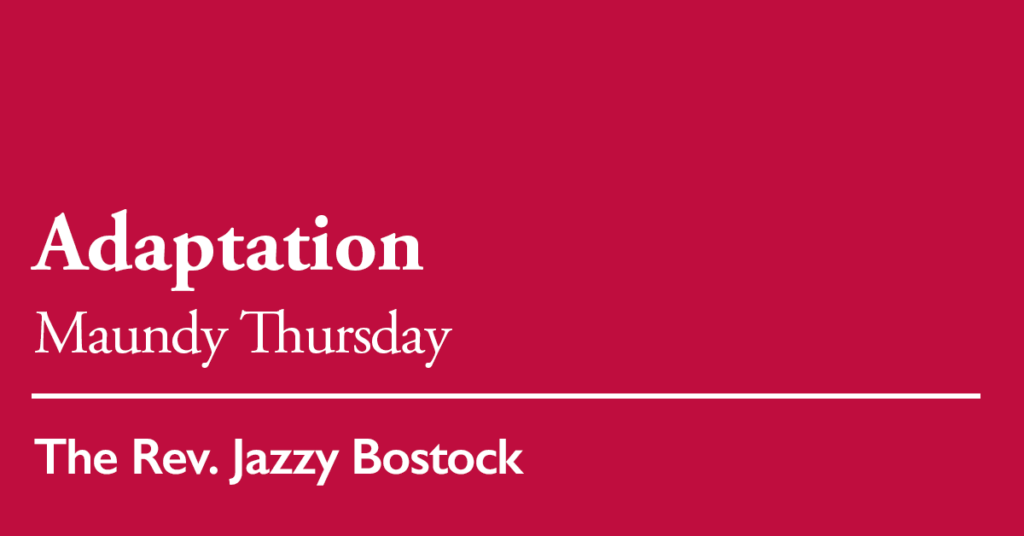Adaptation, Maundy Thursday – 2024
March 28, 2024
[RCL] Exodus 12:1-4, (5-10), 11-14; Psalm 116:1, 10-17; 1 Corinthians 11:23-26; John 13:1-17, 31b-35

There’s a theory you may have heard about – hedonic adaptation. Basically, it means we get used to the circumstances of our lives – and return to our baseline happiness. Here’s an example – You fantasize about buying a new car and save your money to be able to afford it. The day comes and you buy the car. Fabulous! You get a small happiness boost. But likely, by the next day, that dopamine hit has decreased. By the end of the week, even more so. And by the end of the month, you’re used to it. This is just your car now. Your mind adjusts – hedonic adaptation.
Similarly, for something negative – some people express it by saying time heals. For example, when someone first dies, the grief seems almost unbearable. You can’t imagine living without that person. But as time passes, you get into a new rhythm – your baseline returns. Again, hedonic adaptation.
The theory says that each person has a happiness set point, which is basically your genetically determined predisposition towards happiness. No matter, then, what happens in your life – no matter what your circumstances might be – you will return, more or less, to that set point.
Now, what does this happiness theory have to do with Maundy Thursday and Holy Week and preparing ourselves for Easter?
These holy days – this Holy Week – sort of shake us out of our baseline – to remind us of the miracle of resurrection.
Most of the church year, we live in ordinary time. Green is on the altar and we hear the stories and teachings of Jesus – and work to put them into practice in our lives. Of course, Jesus’ resurrection is a premise of our faith – and we affirm it weekly in the Nicene Creed – but by and large, for the most part, this crucifixion and resurrection business is skimmed over. We forget about the incredible miracle that Easter presents to us. We fall into our baseline. We practice hedonic adaptation.
Palm Sunday, Maundy Thursday, and Good Friday pull us out of our baselines – out of our hedonic adaptation – and point us first to the devastation of Jesus’ death, and then to the joy of the miracle which is coming. The story of these holy days, of this Holy Week, gives us time to be shaken up. Time to be pulled out of our baselines, and out of our adaptation – time to hear these stories and hear the wonder in them, as if they were new to our ears.
Today, on Maundy Thursday, Jesus says to his followers that he is leaving them with a new commandment – that they love one another. Now, this feels a bit like a baseline for Jesus, who is always teaching us about love and expansion and how much God has for us. But what may be different here is how close he is to the end. He knows that death is coming, and he suspects that it won’t be a peaceful passing.
And yet, even in the face of this difficulty – even in the face of a cruel, brutal, undeserved death – he tells his disciples to leave the sword behind and to love one another. It’s revolutionary.
No matter how many times we have heard this scripture, no matter how many Maundy Thursdays we have lived through, worshipped through, this teaching should catch us by surprise. It should make our breath catch in our throats.
We might be used to the stories we hear during Holy Week. We might have adapted to them. But if we are willing to hear them again and really listen, then we can’t help but be shaken from our own hedonistic adaptation and be taken on an emotional journey toward the cross.
We have been coming to this point, traveling toward the cross, for all of the Lenten season – but in these three holy days, we really get the opportunity to experience the story of the cross. Even our worship looks different; many churches take today to practice the washing of feet or share an agape meal. Our liturgy clues us into the fact that all is not business as usual – that these days are set apart, meant to shake us awake and make us pay attention once more. The journey we take over these days will not end in death and darkness but in resurrection and new life. We will walk away with a deeper faith, a deeper love of God and of neighbor.
While hedonic adaptation is a theory proven over time, there is an antidote. Meditation or prayer, researchers noted, can elicit positive emotions. Specifically, becoming aware of what we have through mindfulness practices can refocus our energy and give us a bigger, longer-lasting boost to our baseline happiness.
Maybe these holy days function a bit like that. They ask us to practice mindfulness around Jesus’ life and death so that we can hear his resurrection as the fresh miracle that it is. They shake us from our baseline, giving us time to really hear the amazing miracle that is coming as we approach Easter.
So, may this Maundy Thursday be a clarion call – a sign to wake from your slumber, and pay attention. An opportunity to hear Jesus’ preaching about love as the revolutionary act that it is. And may we all be shaken from our own hedonistic adaptations. Amen.
Don’t forget to subscribe to the Sermons That Work podcast to hear this sermon and more on your favorite podcasting app! Recordings are released the Thursday before each liturgical date.
Receive Free Weekly Sermons That Work Resources!


